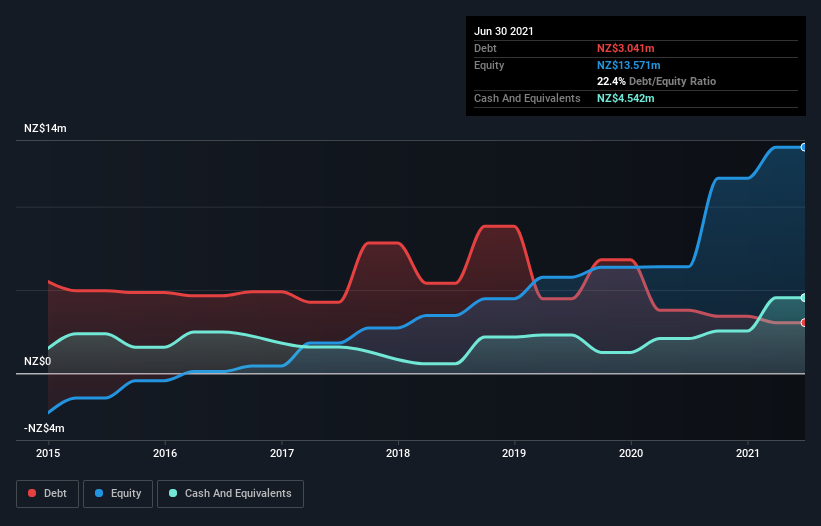
The external fund manager backed by Berkshire Hathaway's Charlie Munger, Li Lu, makes no bones about it when he says 'The biggest investment risk is not the volatility of prices, but whether you will suffer a permanent loss of capital.' So it seems the smart money knows that debt - which is usually involved in bankruptcies - is a very important factor, when you assess how risky a company is. We note that Allied Farmers Limited (NZSE:ALF) does have debt on its balance sheet. But is this debt a concern to shareholders?
When Is Debt A Problem?
Debt is a tool to help businesses grow, but if a business is incapable of paying off its lenders, then it exists at their mercy. In the worst case scenario, a company can go bankrupt if it cannot pay its creditors. However, a more frequent (but still costly) occurrence is where a company must issue shares at bargain-basement prices, permanently diluting shareholders, just to shore up its balance sheet. Of course, plenty of companies use debt to fund growth, without any negative consequences. When we think about a company's use of debt, we first look at cash and debt together.
See our latest analysis for Allied Farmers
How Much Debt Does Allied Farmers Carry?
The image below, which you can click on for greater detail, shows that Allied Farmers had debt of NZ$3.04m at the end of June 2021, a reduction from NZ$3.79m over a year. But it also has NZ$4.54m in cash to offset that, meaning it has NZ$1.50m net cash.

A Look At Allied Farmers' Liabilities
Zooming in on the latest balance sheet data, we can see that Allied Farmers had liabilities of NZ$14.9m due within 12 months and liabilities of NZ$2.83m due beyond that. On the other hand, it had cash of NZ$4.54m and NZ$15.5m worth of receivables due within a year. So it actually has NZ$2.28m more liquid assets than total liabilities.
This short term liquidity is a sign that Allied Farmers could probably pay off its debt with ease, as its balance sheet is far from stretched. Simply put, the fact that Allied Farmers has more cash than debt is arguably a good indication that it can manage its debt safely.
Even more impressive was the fact that Allied Farmers grew its EBIT by 163% over twelve months. If maintained that growth will make the debt even more manageable in the years ahead. The balance sheet is clearly the area to focus on when you are analysing debt. But you can't view debt in total isolation; since Allied Farmers will need earnings to service that debt. So if you're keen to discover more about its earnings, it might be worth checking out this graph of its long term earnings trend.
Finally, a company can only pay off debt with cold hard cash, not accounting profits. While Allied Farmers has net cash on its balance sheet, it's still worth taking a look at its ability to convert earnings before interest and tax (EBIT) to free cash flow, to help us understand how quickly it is building (or eroding) that cash balance. Over the last three years, Allied Farmers actually produced more free cash flow than EBIT. That sort of strong cash generation warms our hearts like a puppy in a bumblebee suit.
Summing up
While we empathize with investors who find debt concerning, you should keep in mind that Allied Farmers has net cash of NZ$1.50m, as well as more liquid assets than liabilities. The cherry on top was that in converted 124% of that EBIT to free cash flow, bringing in NZ$3.7m. So we don't think Allied Farmers's use of debt is risky. When analysing debt levels, the balance sheet is the obvious place to start. But ultimately, every company can contain risks that exist outside of the balance sheet. For example Allied Farmers has 4 warning signs (and 2 which are concerning) we think you should know about.
Of course, if you're the type of investor who prefers buying stocks without the burden of debt, then don't hesitate to discover our exclusive list of net cash growth stocks, today.
New: Manage All Your Stock Portfolios in One Place
We've created the ultimate portfolio companion for stock investors, and it's free.
• Connect an unlimited number of Portfolios and see your total in one currency
• Be alerted to new Warning Signs or Risks via email or mobile
• Track the Fair Value of your stocks
This article by Simply Wall St is general in nature. We provide commentary based on historical data and analyst forecasts only using an unbiased methodology and our articles are not intended to be financial advice. It does not constitute a recommendation to buy or sell any stock, and does not take account of your objectives, or your financial situation. We aim to bring you long-term focused analysis driven by fundamental data. Note that our analysis may not factor in the latest price-sensitive company announcements or qualitative material. Simply Wall St has no position in any stocks mentioned.
Have feedback on this article? Concerned about the content? Get in touch with us directly. Alternatively, email editorial-team (at) simplywallst.com.
About NZSE:ALF
Flawless balance sheet with solid track record.
Market Insights
Community Narratives




